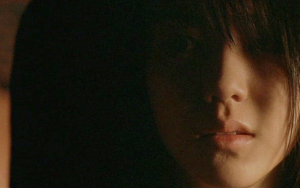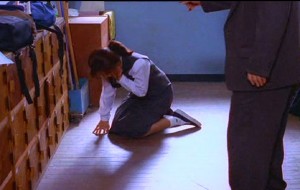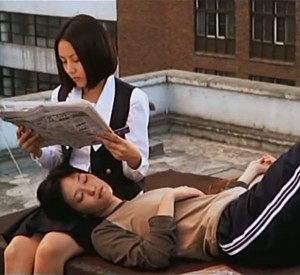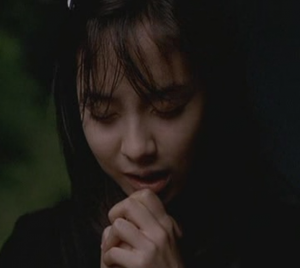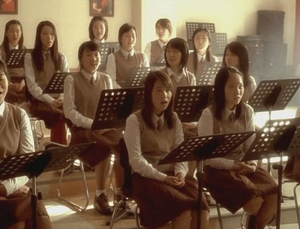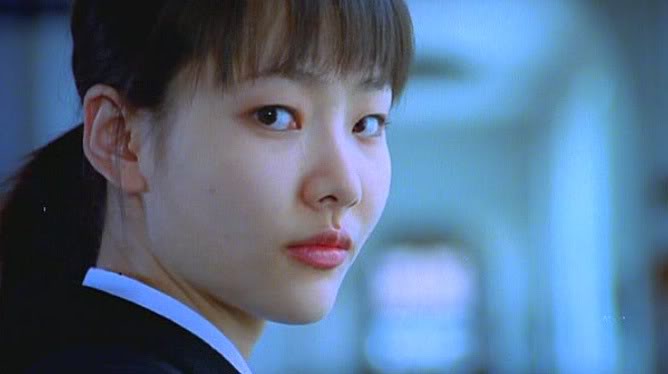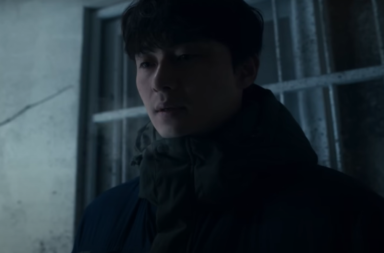Korean high-schools schools nest the territory of the living dead in the Whispering Corridors saga. With the ever-growing interest paid to the Asian cinematography in the 90’s, the horror world started anew, with the Korean film industry being no exception. The first movie in the series came out after South Korea abolished censorship; Park Ki-hyeong (Acaccia, Secret Tears) is incisive in attacking social themes and advancing critique of the educational system, although he only directed the first one. Four other sequels followed its release, keeping some of its motifs: the nearly or entirely lesbian relationships, betrayal, competitiveness among students, the lack of solidarity between them and the setting: all-female high-schools. However, the action differs from one to another and each one has its particular message.
Spoiler alert: I’ll try my best not to ruin the surprise for you, but you should be warned that I will spoil some details.
Whispering Corridors (1998)
The movie starts with the mysterious death of a retired teacher who happened to be investigating the strange case of one student. Just before, she tried to reach out to Eun-young — her ex-student, now a teacher at the same school — to tell her what she has discovered, but she dies before ending her sentence. The plot centers around three friendships: an old tie between Eun-young, a smart, ambitious student and Jin-ju, a bullied girl believed to communicate with the spirits; the talented and trustworthy Ji-oh and shy, dependent Jae-yi; the determined So-young and outcast Jung-sook who don’t speak anymore with each other. Human bonding in the context of an exhausting, highly-competitive high-school system occupies a primal place in the action development.
The film’s two main male characters appear as problematic in the all-female institution dynamics. Mr. Goh openly harasses So-young, threatening her she’ll have to cope with it if she wants to maintain her good grades. The arts teacher is passive, rewarding dedicated students and painting portraits of them; both though seem sexually attracted to their pupils, which is not that abnormal. The girls have a full-grown body and they surround the men, who otherwise have little contact to women since they spend most of their time in school. The Lolitas aren’t happier: with little time remaining after classes, their deepest social relationships are formed with their friends or superiors. The setting — the camera never leaves the school — induces a strong claustrophobic feeling.
A high emphasis is put on academic scores, but the pupil’s drive into doing so is less important. So-young, pressured by her family and teachers, hunts good grades and an admission to Seoul National University, but doesn’t like studying and she couldn’t bother less what major she will pick. She could easily be compared with Ji-oh, who enjoys painting and uses her talent to release her emotions, receiving though harsh punishment and humiliation for doing so..The accent was placed before on Korean, math and social studies, meaning PE and arts were of low-importance, thus Ji-oh, despite her passion and hard work towards following arts, is considered to lack will and commitment. The kids’ misery lies in the way the adults dehumanize them, the most obvious example being Jae-yi in her endless struggle to find someone who cares, admitting that as long as she’s there for the headcount, the others don’t even notice what she really is. The passive aggressiveness of the students and the unhealthy competition between them turns them into cruel, insensitive beings (and bullies), as in Jin-ju’s unfortunate case.
The never-ending cycle that Jae-yi and Jung-sook establish contributes to suggest the system creates them and encloses them in the situation, with the return of Eun-young playing on the same idea. High-school is traumatic, disintegrates relationships and puts one against another, annihilating any means of self-expression. The scenes regarding everyday school life are not dramatic: neither of the male teacher doesn’t sleep with his student, Ji-oh doesn’t turn into a monster after being beaten and the supernatural infiltrates in the little spaces left between the scenes only to glue them together and fasten the message’s delivery. The characters are believable, the situations as well. There’s no flash mob against the teachers, no reports of unethical, disrespectful behavior or the “oh, this can’t be happening” look. Rather, they are students coping in different ways: So-young’s smoking, Ji-oh’s paintings or the collective interest for gossip. The scenes warm up the viewer and lead him to understand what happens and prepares him for the ending without spoiling the surprise.
Memento Mori (1999)
The sequel of Whispering Corridors brings a flashier, dramatized approach which, hats down, needed a good pair of cojones to pull off. Hyo-shin and Shi-eun keep a secret out of their love relationship; the former is sweet, caring and slightly suffocating, while the latter is passive and cautious. Like the first part of Whispering Corridors, where characters find the other ones’ story, Min-ah discovers a journal of the two lovers, gradually unraveling their best and worst moments. The accent drifts on the individuals, letting only three of the girls weave the narrative line. The critique is less sharp. The students are honorific bullies, taunting and stressing over people they don’t even care about. The teacher-student relationship becomes an important part of the plot, as it leads to pregnancy and ultimately suicide. But the critique could be extended on society as well, like the shock the classmates have when the girls come out, choosing to isolate them for it.
The movie keeps the best from the first one: the all-female high-school setting, the way events slowly unfold one after another and the verisimilar characters. I can’t say I’m a fan of the cheap effects (maybe not that cheap, on a second thought), but out of the five, this one balances the best a complex story and an entertaining horror, compressing romance, horror, thriller and drama in one piece. It awakes the empathy and pity of the viewer towards the two while delivering a social and moral critique and a horror movie in one final product. The only complaint I have is with the dull ending, which left the movie with a climax that didn’t lead up to anything.
Wishing Stairs (2003)
Passing from my favorite to the least favorite, Wishing Stairs is a “Be careful what you wish for cause it might come true” type of movie. If you climb the 28 stairs of a campus and a 29th appears, the fox spirit grants you one wish. The protagonists of the movie are ballet-dancers approaching the auditions for Giselle. The movie resembles Black Swan a little (yes, I know it was released earlier), being loosely based on the ballet. So-hee, the pure-hearted ‘princess’ puts all her trust in her girlfriend, Jin-sung, but the latter is less than thrilled of So-hee’s presence and envies her success. She climbs the stairs and asks for the role of Giselle. Jin-sung tries then to sabotage her rival. When she fails, in a burst of anger, she admits to So-hee that she hates her and accidentally makes her fall down the stairs ( a different staircase). In the game of the two comes a strange lonely student, Hye-ju, bullied for her weight, which makes her feel too unsecure to confess her feelings for So-hee. She is granted her wish to become thinner, but she returns one more time with another plight: So-hee’s revival.
While I agree the use of the ballet was a smart move, the poor character development ruined the movie for me, on par with Ahn-jo’s weak performance. Hye-ju didn’t seem believable most of the time. The actress exaggerated, making a caricature out of her character. Jin-sung is one-dimensional, with nothing to display but her envy. The saving grace is the bubbly So-hee (though I don’t know if it’s really So-hee or Park Han-byul coming to the rescue). The relationships are off. The first two movies featured strong, realistic bonding between the girls, but the relationship between So-hee and Jin-sung is clumsily depicted. It didn’t inspire pity for So-hee — the only way her partner’s contempt could have been more obvious was if it had been written on a plane banner. Hye-ju’s obsessiveness lacked consistency throughout the movie.
Bullying, loyalty and cruelty play a role here too, but in the background; the plot lines aren’t coherently jointed to allow the social message to get through. The tone shifted completely from the moral critique to individual guilt. The pace is either too fast or two slow, and the suspense is replaced by cheap scary shots that ruin the possible mystery. The characters raise no empathy. The plot was full with potential, but the story became only a pretext for the happenings. Wishing Stairs was too commercial and graphic to keep up with the Whispering Corridors name.
Voice (2005)
The fourth and the fifth movie will preserve little from the originals. Also set in an all-female high-school, Voice’s premise brought a refreshing touch: the main character dies in the first scene of the movie. Young-eon was rehearsing in the music room when someone begins haunting her and kills her with a music sheet. She wakes up the next day to find out she’s dead and Sun-min, her best friend, is the only one who can hear her. Both begin to investigate her death, questioning on the way their friendship and Young-eon’s honesty.
The movie features great cinematography. The effects don’t even come next to gore and the school offers a beautiful setting for the movie. The soundtrack, including the girls’ Latin songs and the immense chime bells create the perfect atmosphere. The movie focuses anyway on sounds: the spirits can’t find peace and lack strength if they are left unheard; the voice becomes the only means to communicate one’s self. Once Young-eon will lose her voice, she will become powerless. But the message could imply more: human relationships keep us alive and the voice symbolizes the impossibility of humans to separate from the rest.
The movie alternates the past with the present, with Young-eon having the difficult task to remember her wrongdoings and accept her ending. It lacked though something to make the plot move along, making it somewhat dull. The ending was a nice surprise and the events carefully built up to it. But besides its artistic and refined aspect, the movie is somewhere in the middle: both entertaining and boring, beautiful and sloppy at the same time. Decent, to sum it up.
A Blood Pledge (2009)
The last movie features probably the most graphic scenes and playful cameras. The plot is simple: four girls swear to commit suicide that very night, but only one of them dies and (un)surprisingly, Un-joo haunts the other three girls after her death. The plot reveals the tensions existing between the members of the group and the role Un-joo played there, while drifting the so-called friends apart. The ambitious, ruthless and composed Yoo-jin manages to manipulate the other two girls into keeping a low profile. So-hee is the only one overwhelmed by guilt, while Jeong-eon struggles with an abusive father and tries to maintain her position as Yoo-jin’s best friend. Slowly, their secrets are unveiled as to what drove them to sign that pact.
A Blood Pledge touches upon sensitive topics without drawing any blood. Jeong-eon’s situation could have been better showcased. Yoo-jin’s character doesn’t seem motivated enough; her cruelty turns her into a sociopath, making it difficult for the film to have a broader message. The ending was dramatic and so was the movie. Its main plot deals with guilt in different ways: Yoo-jin is incapable of feeling it, playing the real monster in the story, Jeong-eon pleases the others, either her father because of fear or Yoo-jin because of her genuine attachment, but ends up having little of her own; So-hee is the one with a nobler character as she thinks she lead Un-joo to do so and blames herself for not dying. In the equation, the spirit of Un-joo is the justice-maker, intruding in their lives and forcing them to follow the pledge.
Teenage pregnancy, bullying and friendships with a hint at lesbian relationships are the essential themes. A Blood Pledge condenses what all the movies brought until now: the social agenda, the critique of the educational system, the lesbian love, the ever-burdening guilt and restless spirits. However, while more entertaining, it is not as stellar as the others, managing to bring upfront only bits of its promising topics and failing to use all the potential of its characters.
——————————–
The Whispering Corridors movies, with its best and worst moments, are worth watching anytime and even more savory at a second or third watch. Since most of the actresses were beginners when shooting, it’s a chance to discover their roots. I strongly recommend the first two: they both bring awareness over some social issues and it’s an opportunity to analyze a side of the Korean culture, as they are set into an average school. The third one will give you the chills, though not exactly scary. Voice will bring you to its own gracefully-crafted world and it’s the most appealing movie in terms of visuals. Last but not least, the final installment will take you through all the themes and make you emotional with one of the most dramatic (and longest) endings. So grab your popcorn and tell me what you thought of the movies!
